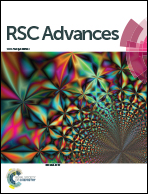A poly(2-(dimethylamino)ethyl methacrylate-co-methacrylic acid) complex induced route to fabricate a super-hydrophilic hydrogel and its controllable oil/water separation
Abstract
Smart hydrogels, or stimulus–responsive (SR) hydrogels which are composed of three-dimensional networks with crosslinked hydrophilic polymer chains can display dramatic volume changes in response to external environments, such as temperature, pH and certain stimuli. Controllable and significant responses to environmental stimuli and super-hydrophilicity are crucial for versatility in terms of oil/water separation, especially. Thermo and pH dual-controllable oil/water separation materials are successfully fabricated by free radical polymerization of 2-(dimethylamino)ethyl methacrylate (DMAEMA) and methacrylic acid (MAA). The substrate of the stainless steel mesh was coated with the super-hydrophilic hydrogel film by simple immersion in an aqueous solution. The as-prepared mesh showed high hydrophobicity with an oil contact angle of about 151° underwater. More importantly, it can be used to separate oil/water mixtures like silicone oil. As shown, water can pass through the processed mesh in temperatures of less than 55 °C (pH 7) and pH values under pH 13 (T = 25 °C) when oil is intercepted on the mesh. Otherwise, the water retention capacity of the hydrogel is significantly reduced. The separation efficiency (98.35%) remains high after 15 uses and the mesh can be easily cleaned, stored, and reused. These properties render such thin films useful for applications to achieve various functional separation materials.


 Please wait while we load your content...
Please wait while we load your content...